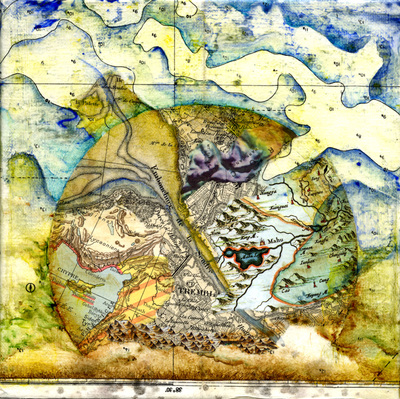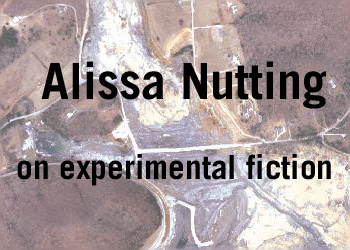ALEXANDER CLARK
Postdiluvian
In 1972, my basement flooded. I know by the stories my neighbors told and the line running the circuit of my basement as a waist high stain. Anecdotes and mild points of interest. The river had grown like some benign monster too long taken for granted, passive and tame, suddenly needing respect, the animal urge to hunt and kill and be wild, overcoming the twenty foot shores of river-cut, man-reinforced banks. My house, most of the city, sits well above the river. My basement’s bottom is twenty-eight feet above the river’s. In 1972 the river climbed thirty-two feet to stare the city in its eye, to hold the people like a lion tamer’s head within the lion’s mouth, to assert the moment when power shifts. The river was tame because it chose to be. We were not to forget this.
Patricia Cameron had been the head mistress at St. Stephen’s Episcopal school for decades when I knew her. She was a strong woman, both of mind and of spirit, not one to allow little problems, a size she considered all problems, to obstruct her.
I was six. My parents and Mrs. Cameron discussed my new house. Mrs. Cameron asked after its position, on it’s likeliness to be flooded. My father replied:
“It’s one of the highest spots on Front Street. We looked at a place in Shipoke but we were worried we’d be flooded.”
“Oh yes, they flood quite frequently. Lovely houses, though. I know the section of Front Street on which your home sits. Do you know the other highest spot on Front Street?”
My father did not.
“Right here. We once had a terrible flood—“
“Oh, during Agnes?”
“Yes. Quite awful. The church was surrounded by water. We thought if ever there were a time to hold services, this was it. We had to wade through Second Street to get to the church and then we held services in our goulashes. We borrowed a row boat the following days so we could check on the building more easily and I couldn’t help but think of ‘Michael Rowed the Boat Ashore’.”
I remember thinking of how neat it would be to ride a boat to school.
We are trapped. Trapped by water, water coming from sides it shouldn’t come, from under the ground, from the sky; water belying the idea of dry anything, the concept of solid ground, an atoll based on rock, an inaccuracy describing the reality that we’ve built our homes and our town on a sponge on a dry day just before the tap’s turned on.
I’m driving, each route forces me back. I’m driving, I can’t seem to get anywhere, driving toward--, each turn ends in ponds or barriers or black sounds of sloshing, impeding water. I’m driving, finally on a route that hasn’t been gotten to yet, hasn’t been cut off by fool men or advancing Susquehannocks. It’s an isthmus now. I keep Dani distracted; tell her to look for something on the floor. To our right Wildwood lake has joined the insurrection and swallowed the trees almost to the road. To the left the unobtrusive puddles swelled and grew every time a back was turned. We would make it off this road, to higher ground. My foot takes us to ninety before I let go of the accelerator at the base of the ascending exit.
Harrisburg is an island; it has always been a place defined by the travel routes, both those physically surrounding it and the business of transportation providing employment for those living in the Susquehanna Valley. Early peoples, American and European, chose sites up and down the river for ease of transit and sustenance. William Penn remarked on the place as one of easy passage and hunting. The eponymous John Harris ran a ferryboat business before acting as warden for the area. Were it not for the river the city wouldn’t exist.
Hundreds of years later, highways are what feed the city, what divides and connects it to surrounding areas. Interstates 81 and 83 roughly define the Northern and Southern borders of the city as surely as the river sets the Western. Were it not for Harrisburg’s status as the capital and the pull of politic the highways would not have come here.
Save the books, my father said. Nothing of my safety, nothing of my live-in girlfriend. I was not an item for concern. Later my father would tell me his concern for my safety was innate; it was to be understood without saying. Along with that lack of expression was that I was in no real danger, he said, I was capable and accoutnable, well able to handle a forced evacuation, the sudden and unwanted responsibilities of patriarch leading his flock of humans, animals and possessions to safety on some imagined higher ground. There was no place to flee to, no place left unclaimed where one could go, the emergency not so great as to forgive violations of property ownership, trespassing still criminal while my own property might be washed away.
The roads were blocked. The highways were clogged. The river was coming.
All water on Earth is connected via the Hydrologic cycle. Water evaporates from a standing body and condenses to form clouds, falls from the sky as rain and joins the same or another body of water or falls on land.
That which makes land fall enters the water table, an ocean interspersed through the micro-chasms between soil particles, one with its on ebb and flow, heights and depths. The state of the water table determines how much rain a given area can absorb as well as how much an area downhill might discharge. Once an area’s water table is completely filled it will absorb no more rain. What falls will pool and sit on the surface, sometimes forming new streams or ponds. If it rains long enough a desert might become a jungle basin and the jungle upstream might turn to sand. Both might wash away.
“No hotel will take us.”
“Why wouldn’t they take us?”
“Three cats, too many to sneak in, and Maximus.”
“Your father’s stupid dog… So what do we do?”
I didn’t know. The mayor had declared looking at the river illegal. She’d threatened to imprison and fine us for our own safety. To shoot us on sight for our own good. She was cutting the power. Blackening the city as the river banks grew shorter.
I was afraid of my basement for the first time since I was a child. Afraid of it more in the dark. Puddles had begun to form, coming up from below, not in from the side where the river was. The river had permeated the ground and was growing, was tired of constraints. Soon, if I needed anything from the basement I’d have to face the leviathan in the dark.
I imagined waist high, cold, dirty water; blind fumblings; ruined papers and heirlooms. I imagined drowning in my basement. The ridiculousness of it. I began hauling boxes of books.
Floods are standardized to one-hundred year intervals and measured using information geologists collect from discharge gauges. It is inevitable that a given active body of water will swell past its banks. Flooding is often cyclical and careful chronological measurement of a river’s depth and speed can give an indication of when and how it might expand in a given year. How far passed the average a river grows is paired with how often the river reaches this size. Floods of greater frequency tend to be benign while those most destructive are rarer. A five year flood would be a fairly regular occurrence, something one living by a river might expect to see often. A ten year flood might close a road or endanger a decrepit bridge. The hundred year flood, the hallmark against which one measures all others, changes maps.
The river had stopped; while Dani, and I, and the cats and, Maximus had slept in a friend’s guest room twenty miles away it had slowed and crested earlier and lower than predicted.
I let them all sleep and went alone to my car.
I passed through the barriers. I edged by new ponds. Nothing seemed so threatening in the morning as it had the night before. The power was still off, the city was still unnatural in its quiet but it felt more like holiday or a broken water mane than the end of times. The epoch wasn’t over. No starting over, no ‘chosen few’ to remain.
The third fifty year flood in fourty years was over. The water would recede, the roads would reopen, classes would resume. People would get tickets and complain about coffee and cell phones and fashions for pets. Normality would return. Already we were beginning to forget.
Works Consulted
Historical Floods: Susquehanna River at Harrisburg
http://www.erh.noaa.gov/marfc/Rivers/FloodClimo/Pointfloods/Msl/Harrisburg-MSL-%20PointFloods-Table.pdf
Highmark Blue Shield Living Legacy Series http://www.idvl.org/harrisburglivinglegacy/Bio47.html
How Does Earth Work? Physical Geology and Process of Science, Gary A. Smith, Aurora Pun, 2010 Pearson Education inc, Pearson prentice Hall, Upper Saddle River, New Jersey 07458
Informal Interview in Person.
Spitler, Richard. Captain
All conversations presented in this piece are facsimiles and amalgamations and are not meant to be taken as verbatim transcriptions of anything spoken by the represented parties.
Patricia Cameron had been the head mistress at St. Stephen’s Episcopal school for decades when I knew her. She was a strong woman, both of mind and of spirit, not one to allow little problems, a size she considered all problems, to obstruct her.
I was six. My parents and Mrs. Cameron discussed my new house. Mrs. Cameron asked after its position, on it’s likeliness to be flooded. My father replied:
“It’s one of the highest spots on Front Street. We looked at a place in Shipoke but we were worried we’d be flooded.”
“Oh yes, they flood quite frequently. Lovely houses, though. I know the section of Front Street on which your home sits. Do you know the other highest spot on Front Street?”
My father did not.
“Right here. We once had a terrible flood—“
“Oh, during Agnes?”
“Yes. Quite awful. The church was surrounded by water. We thought if ever there were a time to hold services, this was it. We had to wade through Second Street to get to the church and then we held services in our goulashes. We borrowed a row boat the following days so we could check on the building more easily and I couldn’t help but think of ‘Michael Rowed the Boat Ashore’.”
I remember thinking of how neat it would be to ride a boat to school.
We are trapped. Trapped by water, water coming from sides it shouldn’t come, from under the ground, from the sky; water belying the idea of dry anything, the concept of solid ground, an atoll based on rock, an inaccuracy describing the reality that we’ve built our homes and our town on a sponge on a dry day just before the tap’s turned on.
I’m driving, each route forces me back. I’m driving, I can’t seem to get anywhere, driving toward--, each turn ends in ponds or barriers or black sounds of sloshing, impeding water. I’m driving, finally on a route that hasn’t been gotten to yet, hasn’t been cut off by fool men or advancing Susquehannocks. It’s an isthmus now. I keep Dani distracted; tell her to look for something on the floor. To our right Wildwood lake has joined the insurrection and swallowed the trees almost to the road. To the left the unobtrusive puddles swelled and grew every time a back was turned. We would make it off this road, to higher ground. My foot takes us to ninety before I let go of the accelerator at the base of the ascending exit.
Harrisburg is an island; it has always been a place defined by the travel routes, both those physically surrounding it and the business of transportation providing employment for those living in the Susquehanna Valley. Early peoples, American and European, chose sites up and down the river for ease of transit and sustenance. William Penn remarked on the place as one of easy passage and hunting. The eponymous John Harris ran a ferryboat business before acting as warden for the area. Were it not for the river the city wouldn’t exist.
Hundreds of years later, highways are what feed the city, what divides and connects it to surrounding areas. Interstates 81 and 83 roughly define the Northern and Southern borders of the city as surely as the river sets the Western. Were it not for Harrisburg’s status as the capital and the pull of politic the highways would not have come here.
Save the books, my father said. Nothing of my safety, nothing of my live-in girlfriend. I was not an item for concern. Later my father would tell me his concern for my safety was innate; it was to be understood without saying. Along with that lack of expression was that I was in no real danger, he said, I was capable and accoutnable, well able to handle a forced evacuation, the sudden and unwanted responsibilities of patriarch leading his flock of humans, animals and possessions to safety on some imagined higher ground. There was no place to flee to, no place left unclaimed where one could go, the emergency not so great as to forgive violations of property ownership, trespassing still criminal while my own property might be washed away.
The roads were blocked. The highways were clogged. The river was coming.
All water on Earth is connected via the Hydrologic cycle. Water evaporates from a standing body and condenses to form clouds, falls from the sky as rain and joins the same or another body of water or falls on land.
That which makes land fall enters the water table, an ocean interspersed through the micro-chasms between soil particles, one with its on ebb and flow, heights and depths. The state of the water table determines how much rain a given area can absorb as well as how much an area downhill might discharge. Once an area’s water table is completely filled it will absorb no more rain. What falls will pool and sit on the surface, sometimes forming new streams or ponds. If it rains long enough a desert might become a jungle basin and the jungle upstream might turn to sand. Both might wash away.
“No hotel will take us.”
“Why wouldn’t they take us?”
“Three cats, too many to sneak in, and Maximus.”
“Your father’s stupid dog… So what do we do?”
I didn’t know. The mayor had declared looking at the river illegal. She’d threatened to imprison and fine us for our own safety. To shoot us on sight for our own good. She was cutting the power. Blackening the city as the river banks grew shorter.
I was afraid of my basement for the first time since I was a child. Afraid of it more in the dark. Puddles had begun to form, coming up from below, not in from the side where the river was. The river had permeated the ground and was growing, was tired of constraints. Soon, if I needed anything from the basement I’d have to face the leviathan in the dark.
I imagined waist high, cold, dirty water; blind fumblings; ruined papers and heirlooms. I imagined drowning in my basement. The ridiculousness of it. I began hauling boxes of books.
Floods are standardized to one-hundred year intervals and measured using information geologists collect from discharge gauges. It is inevitable that a given active body of water will swell past its banks. Flooding is often cyclical and careful chronological measurement of a river’s depth and speed can give an indication of when and how it might expand in a given year. How far passed the average a river grows is paired with how often the river reaches this size. Floods of greater frequency tend to be benign while those most destructive are rarer. A five year flood would be a fairly regular occurrence, something one living by a river might expect to see often. A ten year flood might close a road or endanger a decrepit bridge. The hundred year flood, the hallmark against which one measures all others, changes maps.
The river had stopped; while Dani, and I, and the cats and, Maximus had slept in a friend’s guest room twenty miles away it had slowed and crested earlier and lower than predicted.
I let them all sleep and went alone to my car.
I passed through the barriers. I edged by new ponds. Nothing seemed so threatening in the morning as it had the night before. The power was still off, the city was still unnatural in its quiet but it felt more like holiday or a broken water mane than the end of times. The epoch wasn’t over. No starting over, no ‘chosen few’ to remain.
The third fifty year flood in fourty years was over. The water would recede, the roads would reopen, classes would resume. People would get tickets and complain about coffee and cell phones and fashions for pets. Normality would return. Already we were beginning to forget.
Works Consulted
Historical Floods: Susquehanna River at Harrisburg
http://www.erh.noaa.gov/marfc/Rivers/FloodClimo/Pointfloods/Msl/Harrisburg-MSL-%20PointFloods-Table.pdf
Highmark Blue Shield Living Legacy Series http://www.idvl.org/harrisburglivinglegacy/Bio47.html
How Does Earth Work? Physical Geology and Process of Science, Gary A. Smith, Aurora Pun, 2010 Pearson Education inc, Pearson prentice Hall, Upper Saddle River, New Jersey 07458
Informal Interview in Person.
Spitler, Richard. Captain
All conversations presented in this piece are facsimiles and amalgamations and are not meant to be taken as verbatim transcriptions of anything spoken by the represented parties.
Copyright © MONTH 2017 Map Literary and Alexander Clark

Alexander Clark is a writer and artist living in Harrisburg Pennsylvania. He was graduated with High Distinction from Penn State University in 2015 and has since worked as a freelance copy editor, writer, social media admin, and horticulturalist. An avid reader and kung fu practitioner, Clark divides his time between coffee shops, writing, and the training floor, being kicked.









